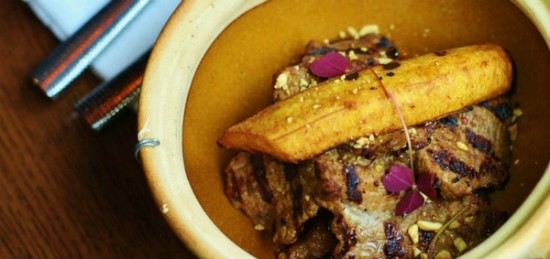As millennial chefs and foodies seek out authentic global flavors, they are introducing new cultural cuisines to the American food scene. African cuisine is expanding across the country with young chefs delivering new dishes adapted or replicated from the Old World. But as soups, stews and sauces with peanut ingredients are served up in authentic dishes, it’s interesting to note that this is not the first entrée of African flavors on the American culinary palate. In fact, West African dishes, and peanuts themselves, are experiencing a culinary reawakening as chefs trace the roots and discover the indelible influence of African heritage on American culture and cuisine.
Peanuts are a common ingredient in West African cooking, and are notable in the nutritional characteristics of West African cuisine. But they also reveal how African heritage played a critical role in shaping American culture and helped make peanuts an American icon.
Brought by the Portuguese, peanuts were similar to a native African plant
Peanuts are not native to the African continent, but were introduced by Portuguese explorers along the West African coast in the early 1500s. Because peanuts were similar to an indigenous African plant known as the Bambara groundnut, they were easily substituted for the native nut in traditional dishes. Since peanuts were easier to grow and were prolifically produced, they eventually replaced the Bambara groundnut in traditional soups and stews. They became an important part of traditional West African cooking, and followed the route of the African diaspora.
According to author Andrew F. Smith, “Slave ships coming to America were provisioned with peanuts, and it was through the slave trade that peanuts were introduced into what is today the United States.” Indeed, Africans were the first to bring peanuts to the American colonies, and West African cultural influence helped to propel peanuts as a favorite American food. And the prominence of peanuts as part of popular American culture was solidified with George Washington Carver’s publication on peanut inventions: “How to Grow the Peanut and 105 Ways of Preparing it For Human Consumption.” As millennial chefs research and recreate traditional African meals on American menus, peanuts are remerging as an integral part of both West African and American culinary history.
Young black chefs explore and present African cuisine to American diners
A recent New York Times article shows how young black chefs are tracing the influence of African culture on American cuisine, and showcasing it on their menus. The article notes that Mashama Bailey of the Grey restaurant in Savannah, Georgia read through old cookbooks and created dishes that illustrate how West African tradition was reflected in early American cuisine. Colonial-era peanut soups were based off of traditional recipes such as West African mafe. And a contemporary peanut stew recipe from cookbook authors Alice Randall and Caroline Randall Williams shows not only how peanuts bridge that connection of American cuisine with African heritage, but also contributed to the collective identity of soul food in American cooking.
Chef JJ Johnson at the Cecil in Harlem, New York is taking that influence on American culinary identity further by highlighting the melting pot nature of American culture and melding African cuisine with other cultural influences. He sees peanuts as a common element in both West African and Asian cooking, and uses them in fusion dishes such as his beef suya with ground peanuts, and udon noodles with pork and peanut sauce. These young, black chefs are tipping their hats to the African heritage that profoundly influenced American culture and are underscoring peanuts as an American icon with African roots.
African heritage and culinary tradition has had a significant influence on American culture. Peanuts are a perfectly powerful example of that influence, and a dedication to African American history. So, celebrate this week by eating at an African restaurant. Make a traditional African recipe at home. Or, have some peanuts and know that their history in American cuisine is rooted in African heritage.
Smith, A. F. (2002). Peanuts: The Illustrious History of the Goober Pea. Chicago, IL: University of Illinois Press.
